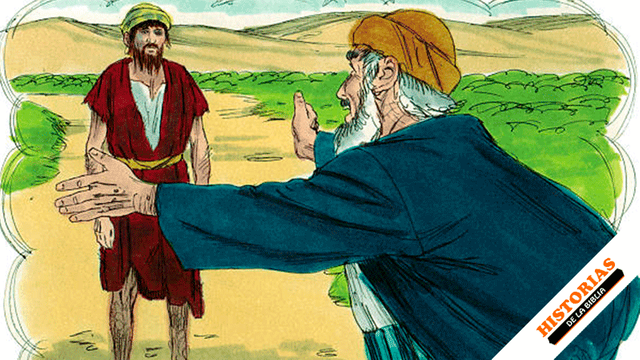A parable with a meaning that is overlooked.
The story is very short. A father had two children, and when the child came of age, he asked him to give him his share of the inheritance. The father grants his request and soon his son leaves for another country, where he squanders his wealth with a sumptuous way of life in which he wastes and makes all kinds of unnecessary expenses.
After he has squandered all his money, he barely survives with a job in which he took care of pigs. Hungry and penniless, he begins to reconsider. He decides to go back to his father and apologize for his foolish behavior. He expects his father to accept him as only one of his servants. To his surprise, and the displeasure of his older brother, his father welcomes his youngest son, with a great celebration (Luke 15: 11-32).
When we understand that this parable is an imaginary story to illustrate a spiritual point, we can quickly perceive that Jesus is using this story to teach us of the love that God the Father has for each one of us. And, while we have all been sinners, as was the prodigal son, it is comforting, comforting, and yes, it is almost incomprehensible that God the Father is willing to accept us back, given the mistakes we have made.
This summary of the parable is well known and we are very moved to understand it. But now, let's analyze what is not so commonly perceived about this story and what this knowledge should motivate us to do.
The context
Taking the context of the biblical passage into account often helps us to better understand its meaning, and this is the case with the parable of the prodigal son. The scenario of this parable is found in Luke 15: 1-2, where we see the Pharisees and the scribes criticizing Jesus for sharing and eating with sinners. These early-century Jewish religious leaders did not think it was appropriate for a person of God to interact in this way with those who were not righteous.
The accusation of the Pharisees and the scribes set the stage for three parables (the third of which was that of the prodigal son), in which Jesus teaches these Jewish authorities and us today, how God deals with sinners.
Sometimes the important principles are repeated in the Bible for emphasis. This is the case when Jesus asked Peter three times to feed his sheep (John 21:17). To respond to the rebuke of the Pharisees and scribes, recorded in Luke 15: 1-2, Jesus mentioned three parables that emphasized his response.
The first parable is about the lost sheep (Luke 15: 4-7). In this story, the shepherd has 100 sheep. When one of them is lost, he leaves the remaining 99 to go and find the one that has been lost. After finding her and bringing her home, she rejoices with her friends and neighbors.
source
In the Bible, often the people of God are called sheep or the flock of God (Matthew 26:31, Luke 12:32, John 21:17, Acts 20: 28-29). Pastors are warned to shepherd "the flock of God" (1 Peter 5: 2), and when referring to Jesus, he says that he is the "prince of the shepherds" (v. 4). The point of the parable is that God wants to bring all those who are lost (sinners) to a relationship with Him, and rejoices when they repent.
The second parable is of a woman who loses one of her 10 silver coins. The woman lights a lamp and sweeps and searches carefully throughout her house looking for the lost coin. When he finds her, he also rejoices with his friends and neighbors (Luke 15: 8-10).
Some have wondered why the loss of a single coin is given so much importance. Comments have suggested that this may be due to two reasons. First, the homeowner was perhaps poor and the currency, although it was not much in itself, could under these circumstances be very important for the family. Second, the coin that was lost could have been part of a forehead band composed of 10 coins that symbolized a marriage vow - something similar to what currently represents a wedding ring.
Similarity of the parables
Let's look at the common theme of the three parables. Whether it is a lost sheep, a lost coin or a lost child, there is joy and rejoicing when what was lost is recovered.
There is also an interesting progression in these parables from a numerical perspective and its value. The Expositor's Bible Commentary anonymous..It is not just a mathematical progression, since what is lost increases from a hundredth to a tenth, and then to a half of the whole, but also the intrinsic value of the loss is increased in the corresponding series. In the first parable it was a lost sheep, a loss that could be replaced soon, and soon it would be forgotten too; in the second, it was a lost coin and, as we have seen, the loss was of something more valuable than gold, even honor and character, while in the third it was 'a lost son' "(comments about Luke 15: 1-32).
The three parables of Luke 15 also answer the question posed by the Jewish authorities and were typified by the older brother in the third parable - whether it was appropriate or not for Jesus to consider or even mix with sinners. The parables show that God does care about human beings and rejoices when they are rescued from problems. And so should we, too.

source
The reason for the celebration and acceptance
While many have noted that the parable of the prodigal son and the two parables preceding it in Luke 15 point to God's love for humanity, many have lost sight of the teaching in them, which is the reason for the celebration of God.
Speaking of the parable of the lost sheep, Jesus explained: "I tell you that in the same way there will be more joy in heaven for a sinner who repents than for ninety-nine righteous people who do not need repentance" (verse 7). And later, when speaking of the parable of the lost coin, he said: "Thus I tell you that there is joy before the angels of God over a sinner who repents" (v. 10).
As we continue with the theme of repentance, we see what the prodigal son told his father when he returned: "Father, I have sinned against heaven and against you, and I am no longer worthy to be called your son" (v. 21) . The rejoicing of God the Father and his spiritual family, which includes the angels, is the product of repentance.
Repentance: a central theme in the teaching of Christ
Jesus' emphasis on repentance was not a new theme that he was touching in these parables. Often, He spoke of the need we have to repent.
When he began his public ministry, Jesus said: "Repent, for the kingdom of heaven is at hand" (Matthew 4:17, emp. Added). In summarizing four key elements of the teachings of Christ, Mark recorded it when Jesus said to the people: "The time has been fulfilled, and the kingdom of God has come near; Repent, and believe in the gospel "(Mark 1:15, emphasis added). And on two occasions, when people died in unexpected events, He noted: "... before, if you do not repent, you will all perish equally" (Luke 13: 3, 5).
Since repentance is such an important issue for all who want to be part of the eternal family of God, it should not surprise us that Jesus included this teaching in the parable of the prodigal son and in the two parables that precede it in Luke 15.
The title of the parable
When it comes to the names that have been given to the parables of Jesus, we notice that they are not necessarily what Christ has given them. The Bible does not specifically give us names for parables. We humans have given names that help us identify and remember them.
The parable of the prodigal son is not a bad name, because it does help us to remember the teaching of Christ. But this parable could have been called in a different way. The Expositor's Bible Commentary states: "We call the parable of the prodigal son, but it could also have been called, with equal merit, the parable of the disconsolate father, because the whole story crystallizes around this name, repeating it, one way or another, no less than 12 times. "
Jesus said that He came to reveal the Father (Matthew 11:27, Luke 10:22), and the parable of the prodigal son really does. In fact we do have a Heavenly Father who desires immensely that each one of us repents of his sins, so that we can be part of his eternal family.
The parable of the prodigal son is a wonderful and amazing story. But even more important is what has been overlooked in his message, and this is that we all have to repent.

